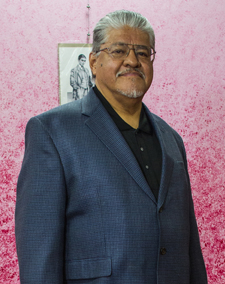The title of poet laureate is one of the highest honors a poet can hold, but beyond the honor, the post can mean a variety of things. The United States has a national poet laureate, forty state poets laureate, and countless more at the local level, in dozens of cities and towns across the country. All of these offices are overseen by different organizations, from the Library of Congress to local arts councils, and almost none of them have a universally agreed-upon definition of the title. Some have launched initiatives to bring poetry to the classroom, while others have sent poets themselves to the schools. Robert Pinsky asked Americans to send him their favorite poems, while Ted Kooser told the country about his favorites. We talked to three poets laureate—Luis J. Rodriguez, the current poet laureate of Los Angeles; Joseph Bathanti, the former poet laureate of North Carolina; and Natasha Trethewey, the former poet laureate of the United States and current poet laureate of Mississippi—to find out exactly what the title means to them. While they each have a different take, all three shared a common mission: to go out into the community (whether that be a city, a state, or the entire country) and talk to people about poetry and explore the influence it can have on our lives.
Luis J. Rodriguez
Los Angeles Poet Laureate, 2014–2016
The author of nine books of poetry, fiction, and nonfiction, most recently the memoir It Calls You Back: An Odyssey Through Love, Addiction, Revolutions, and Healing, published by Touchstone in 2011. His most recent poetry collection is My Nature Is Hunger: New & Selected Poems, published by Curbstone Books in 2005.
 Before becoming the second poet laureate of Los Angeles, you founded a cultural center, helped start an organization for at-risk youth, worked in gang intervention, and campaigned for urban peace, actually helping to broker peace agreements between warring gangs. As poet laureate, what do you envision as your main project? How will this differ from the extensive work you’ve done in the past? Does the position afford you resources you didn’t have before?
Before becoming the second poet laureate of Los Angeles, you founded a cultural center, helped start an organization for at-risk youth, worked in gang intervention, and campaigned for urban peace, actually helping to broker peace agreements between warring gangs. As poet laureate, what do you envision as your main project? How will this differ from the extensive work you’ve done in the past? Does the position afford you resources you didn’t have before?
I have forty years of experiences working with troubled youth, in gangs and outside of gangs, for urban peace…for a healthy and clean environment, against poverty, and for social justice. This makes me a unique addition to the poet laureate tradition. Poets laureate are supposed to sing the praises of rulers, kings, queens, or the state; I [want to] sing the beauty and bounty of Los Angeles, but also point out its faults, such as income inequality, [how it is] both the poorest county in the country and one of the richest. My goal is beauty, truth, and the good.
But to do that I have to address the darkness as well as be a beacon for what’s possible, to consider new ways of thinking, living, and relating. An aim then is to use words, images, sound, and movement to convey the parameters of a just, equitable, and free world. However, I don’t want to make this position a “bully pulpit.” While I have a lot to say, and much to decry, I will do this with dignity, responsibly and artfully. There is far more good in Los Angeles, and from here the threads of a caring, cooperative, and fully conscious governance and economy should be imagined and created.
All this informs what I plan to do as poet laureate, including establishing and/or taking part in at least six city-wide events a year; facilitating workshops with youth and neglected communities; visiting and incorporating as many venues, open mics, and important spaces as possible; and, of course, writing poems. I will also work with others—the Mayor’s office, the City Council, the Department of Cultural Affairs, the L.A. Public Library system, community organizations, and more—to help poetry and the arts explode everywhere. I have always been doing this; now I can continue and magnify my life’s work by other means. I’m eager to use whatever resources this position may afford me to do just that.
You’ve also run for public office—including governor of California—a couple of times. Do you consider the office of poet laureate to be a political position? Do your personal politics inform the way you plan to operate as poet laureate?
Everything I do is intertwined with politics. But I can discern the difference between running for political office, which is ultimately about governance, and being a poet laureate, which I see as being representative of a vast and diverse city with many voices, stories, flavors, and tongues. Mayor Eric Garcetti is moving in the right direction by addressing minimum wage, the environment, and the arts. Politically we may agree. But I’m aware that I have to be careful of how I use this position—neither to be the mayor’s “water boy” nor to seek occasions to attack him. Mostly I want to look outward, to people and their everyday concerns.
By its nature, poetry can address any and all issues, including governance. It is also a highly personal and revealing art form. I aim to help bring poetry to the center of our culture. Presently, poetry in our city, state, and country is highly marginalized, concentrated in a few hands; it’s not promoted and mostly unused. People are much more engaged in popular culture, sports teams, video games, reality shows, celebrity gossip—which is all entertaining, but very much pushed on the rest of us. There’s big money in this. Poetry is not that easily appropriated. You don’t need an industry to do poetry. Anyone is capable. Poetry, like most art, is internal. Provide skills, mentoring, and cultural spaces, and poetry can come alive for anyone.
Poetry is deep soul talk, truth derived, and therefore immanently scary. It’s a prophetic act, not in the sense that poetry or art “predicts” the future, but that it pulls from the threads of the past, the dynamics of the present, to point to a future free of uncertainties and inequities. I [want to use] my assignment as poet laureate to emphasize the healing and revolutionary qualities of poetry to a city hungry for authenticity and personal authority. Therefore, my politics, ideas, and experiences inform this position; I’ve also taken into account the particular limits and requirements of being poet laureate. They are not contradictory.
I’m curious about this idea of poetry being both healing and revolutionary—can you say more about that?
I found poetry to be healing in my life. Without pressures from teachers, I wrote my heart out as a teenager in jails, in the street, but mostly in a small room next to the family garage that I stayed in until age eighteen. I became expressive, emotive, revealing—unlike the stammering and inarticulate noises of a sensitive and shy child. For me, writing became inseparable from spiritual and psychological growth. As a raging young man, writing provided a powerful outlet. All rage ultimately has roots in deep grief. I tapped into this as well. That’s why many therapists use writing in their treatments. I don’t claim that poetry is a full treatment program, but it’s therapeutic nonetheless. And in thirty-five years of doing workshops in schools, prisons, juvenile lockups, migrant camps, homeless shelters, Native American reservations, universities, and colleges, I’ve seen the power of writing and poetry to awaken the dream of one’s life.
Later when I decided to make writing a profession, I went back to school to learn grammar, spelling, and syntax. These are invaluable. These helped me sharpen the three aspects of any great art: clarity, gravity, and integrity. These are also aspects of a developed life. Yet they are not necessary to draw stories, imaginings, fears, and hopes from the most reticent of audiences.
The revolutionary nature has much to do with poets being the truth-tellers of the culture. They are the first to point out that the “emperor has no clothes”—or that a society at its core is bankrupt. Poets do this artfully—with powerful images, interesting language, and a musical sense. In addition, expanding any concept of revolution, it is also of the mind, the heart, and culture. Revolution is for the right kind of change to re-balance the right kind of inequity. Not simply ideological, but tied to objective and palpable needs. Poetry, like all art, can be politically and humanly charged. I’m for that, challenged also by the nature of the art.








